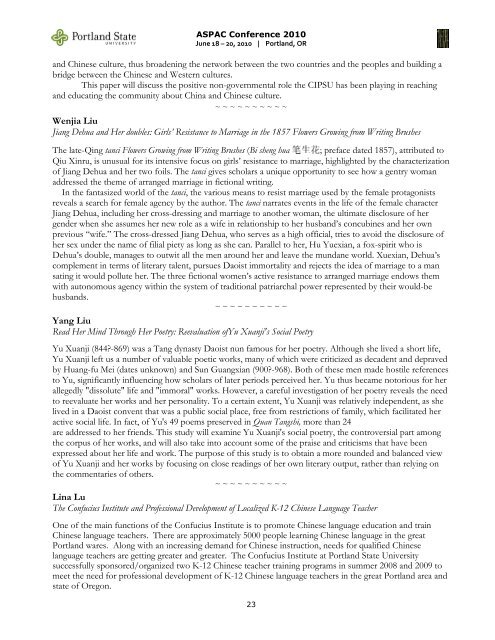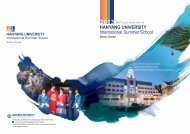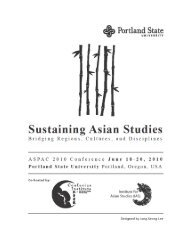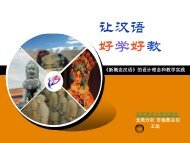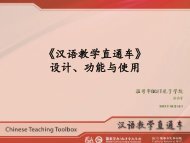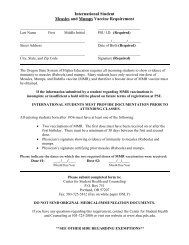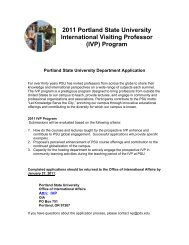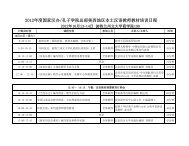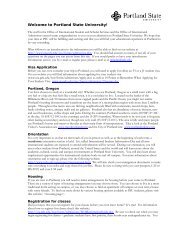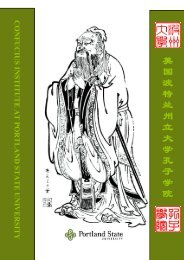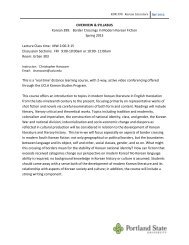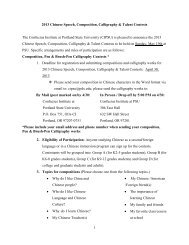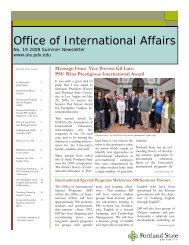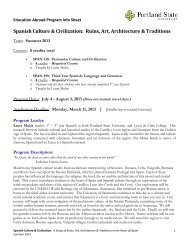ABSTRACTS - oia - Portland State University
ABSTRACTS - oia - Portland State University
ABSTRACTS - oia - Portland State University
Create successful ePaper yourself
Turn your PDF publications into a flip-book with our unique Google optimized e-Paper software.
ASPAC Conference 2010<br />
June 18 – 20, 2010 | <strong>Portland</strong>, OR<br />
and Chinese culture, thus broadening the network between the two countries and the peoples and building a<br />
bridge between the Chinese and Western cultures.<br />
This paper will discuss the positive non-governmental role the CIPSU has been playing in reaching<br />
and educating the community about China and Chinese culture.<br />
~ ~ ~ ~ ~ ~ ~ ~ ~ ~<br />
Wenjia Liu<br />
Jiang Dehua and Her doubles: Girls’ Resistance to Marriage in the 1857 Flowers Growing from Writing Brushes<br />
The late-Qing tanci Flowers Growing from Writing Brushes (Bi sheng hua 笔生花; preface dated 1857), attributed to<br />
Qiu Xinru, is unusual for its intensive focus on girls’ resistance to marriage, highlighted by the characterization<br />
of Jiang Dehua and her two foils. The tanci gives scholars a unique opportunity to see how a gentry woman<br />
addressed the theme of arranged marriage in fictional writing.<br />
In the fantasized world of the tanci, the various means to resist marriage used by the female protagonists<br />
reveals a search for female agency by the author. The tanci narrates events in the life of the female character<br />
Jiang Dehua, including her cross-dressing and marriage to another woman, the ultimate disclosure of her<br />
gender when she assumes her new role as a wife in relationship to her husband’s concubines and her own<br />
previous “wife.” The cross-dressed Jiang Dehua, who serves as a high official, tries to avoid the disclosure of<br />
her sex under the name of filial piety as long as she can. Parallel to her, Hu Yuexian, a fox-spirit who is<br />
Dehua’s double, manages to outwit all the men around her and leave the mundane world. Xuexian, Dehua’s<br />
complement in terms of literary talent, pursues Daoist immortality and rejects the idea of marriage to a man<br />
sating it would pollute her. The three fictional women’s active resistance to arranged marriage endows them<br />
with autonomous agency within the system of traditional patriarchal power represented by their would-be<br />
husbands.<br />
~ ~ ~ ~ ~ ~ ~ ~ ~ ~<br />
Yang Liu<br />
Read Her Mind Through Her Poetry: Reevaluation ofYu Xuanji's Social Poetry<br />
Yu Xuanji (844?-869) was a Tang dynasty Daoist nun famous for her poetry. Although she lived a short life,<br />
Yu Xuanji left us a number of valuable poetic works, many of which were criticized as decadent and depraved<br />
by Huang-fu Mei (dates unknown) and Sun Guangxian (900?-968). Both of these men made hostile references<br />
to Yu, significantly influencing how scholars of later periods perceived her. Yu thus became notorious for her<br />
allegedly "dissolute" life and "immoral" works. However, a careful investigation of her poetry reveals the need<br />
to reevaluate her works and her personality. To a certain extent, Yu Xuanji was relatively independent, as she<br />
lived in a Daoist convent that was a public social place, free from restrictions of family, which facilitated her<br />
active social life. In fact, of Yu's 49 poems preserved in Quan Tangshi, more than 24<br />
are addressed to her friends. This study will examine Yu Xuanji's social poetry, the controversial part among<br />
the corpus of her works, and will also take into account some of the praise and criticisms that have been<br />
expressed about her life and work. The purpose of this study is to obtain a more rounded and balanced view<br />
of Yu Xuanji and her works by focusing on close readings of her own literary output, rather than relying on<br />
the commentaries of others.<br />
~ ~ ~ ~ ~ ~ ~ ~ ~ ~<br />
Lina Lu<br />
The Confucius Institute and Professional Development of Localized K-12 Chinese Language Teacher<br />
One of the main functions of the Confucius Institute is to promote Chinese language education and train<br />
Chinese language teachers. There are approximately 5000 people learning Chinese language in the great<br />
<strong>Portland</strong> wares. Along with an increasing demand for Chinese instruction, needs for qualified Chinese<br />
language teachers are getting greater and greater. The Confucius Institute at <strong>Portland</strong> <strong>State</strong> <strong>University</strong><br />
successfully sponsored/organized two K-12 Chinese teacher training programs in summer 2008 and 2009 to<br />
meet the need for professional development of K-12 Chinese language teachers in the great <strong>Portland</strong> area and<br />
state of Oregon.<br />
23


